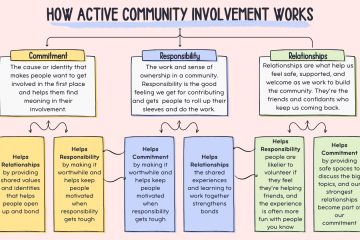I recently read a friend’s debut novel, which takes place in a Seattle megachurch. While I have no doubt that facets of it were exaggerated for literary effect, it still made me even warier of megachurches. All larger congregations, really.
And before you get nervous, this is not going to be about religion. Well, at least not theology. I’m not going to dive into the culture wars or otherwise make this about topics that cause shouting on the internet. I hope not.
While reading, I was reminded how lucky I was to have had a positive experience with religion and the church my family attended. One of the things that made my childhood church so positive for me was its size. We knew everyone. There was Sunday School for children, but not a lot of other specialty groups based on age or gender. Everyone, young, old, rich, poor, long-time member or brand new, participated in events equally and got to know each other. Everyone would lend a hand to help with whatever needed done.
I started realizing how different this was when I got to middle school and I had friends who would talk about their youth groups. These were serious endeavors, with their own worship times, events, and pastors. I guess part of me might have thought it sounded cool? But I also enjoyed being able to do things like help my mom set the altar and talking with adults as equals after the service. We also didn’t take fancy missions trips to other countries, but we did operate a small shelter and food pantry. I could occasionally volunteer and gain first-hand experience with how pervasive food insecurity is. It was my neighbors who were hurting.
The Technology that Made It Happen
Starting in the 1970s, though, larger and larger congregations, some blossoming into megachurches, supplanted local parishes. Celebrity preachers were nothing new, but technology turned them into an industry. Broadcasting made them well-known. Cars helped people drive to attend church farther away from home. Credit cards and direct debits made it easier for churches to amass large amounts of money.
Computers made administration easier. I’m not even talking about the internet and the plethora of religion-specific startups out there. Basic things like making copies of programs or sending out newsletters got exponentially simpler throughout the second half of the century. That may sound like a good thing, but every task that can be done by technology means less work for volunteers in the parish. Even decorations and signs are done these days by computer graphics instead of people doing it themselves.
Making the Personal, Impersonal
Proponents will say that they’re “spreading the good word” or “bringing more people to God”. But the problem with larger congregations is that people lose out on learning how to be directly involved and making a diverse set of real connections. When I was growing up, from a young age I had to help at church. I’d help decorate for holidays. I’d help dry dishes after coffee hour. Sometimes it would be just serving as a gofer for the adults. It wasn’t anything formal, but it instilled a sense that it was a group effort, and I had a duty and a right to help the church function just like everyone else.
Larger churches solve the problem of being impersonal by offering small groups. It works in theory, I guess, but when researching this I found the system oddly rigid. For one thing, they’re frequently divided up based on geography or stage of life. They’re also stagnant, with set leaders and relatively little variation. Gone is the ebb and flow of meeting people, working on something together, and then growing closer or farther apart. We don’t get to know the same diversity of people. And if you’re not part of one, you’re pretty much stuck being just a face in the crowd.
The main issue I see is how top-down everything is. Huge congregations have more professional staff to deal with things. Sunday school or even something simple as greeting people is part of a complex hierarchy. It’s easier for people to feel siloed instead of part of a network of people working together for a common goal. And with so many levels and systems in place, not to mention the people paid to do it, fewer people have to actually be involved to keep things going.
One of the most frequent criticisms levied against megachurches is that they serve as a cult of personality to a celebrity pastor. I won’t get into the nitty gritty of that argument, but I will say this. I think part of the reason I’m drawn to megachurches as the source of problems is how congregations naturally follow and listen to a strong leader. It’s much easier for all decisions, big and small, to come from the top.
At the most basic level, It’s much less likely that someone will contact you, by name, and ask for help with a specific thing. For that matter, it’s less likely that you’ll be able to work your way up to even volunteer for many things. That goes for everything from helping to load the soda machine, to being in charge of an upcoming fundraiser, to serving on a vestry or other board to help guide the congregation. That feeling of being able to take ownership and be part of the process does more to create a sense of community than any small group meeting ever can.
Fixing It Takes Work
I put the blame on megachurches because religion tends to be a big part of people’s lives. For many people, it’s the main way they’re involved in their community. Once that active involvement becomes passive consumption it’s harder to get people engaged in other organizations. Many people don’t even see it as their place to get involved. They’ve gotten used to being able to sign up for individual events or tasks without having to be part of the organizational team.
If people can be “involved” by paying money, maybe showing up to dinner at someone’s house once a week, and volunteering to help with one thing and one thing only, who’s going to want to take on the job of being treasurer for their local rotary club or organize a block party? It’s community involvement without any individual responsibilities, and we’re all the worse off for it.
Responsibility and shared ownership is at the very heart of what a community is. It doesn’t matter if it’s a faith community or something else entirely. When I was a teenager, did it sometimes feel like a burden when I had to go do things for our church? Absolutely. But looking back on it, I also remember feeling a sense of pride and commitment that’s shaped my own outlook on volunteering.
We’re going to have to step up and get involved beyond the ways we’ve become accustomed to. Without more effort on the part of individuals, we don’t have a prayer of creating the sense of community we want.



0 Comments